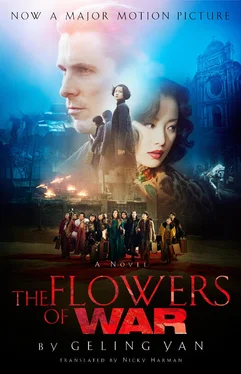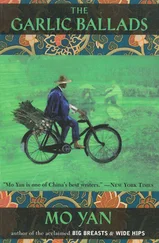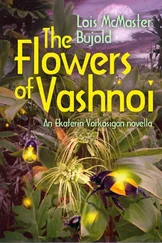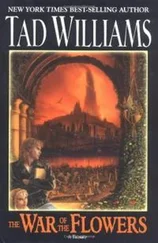‘They’ve got guns and we’re weaponless. What’s the point in tying us up?’
‘I won’t let them!’
The officer shouted an order and all the Japanese soldiers stood with bayonets at the ready.
The Chinese quieted down and huddled closer together.
The loud-hailer transmitted the Japanese officer’s explanation. ‘Tying your hands is to keep you in order. If we lose control and disorder breaks out when you’re crossing the river, then it could be very dangerous. The Imperial Army is only concerned with your safety.’
The collaborator shouted himself hoarse through the loud-hailer but the soldiers were sceptical.
One shouted back: ‘If they tie our hands, then how will we eat when we get to the river?’
The collaborator had no answer to that. But the question alerted the other soldiers: Hadn’t the Japanese said they would be fed when they got to the river? So why were they saying now that tying their hands was to maintain order on the boats? How could they hold a bowl and pick up a steamed bun with their hands tied? And there were only a few Japanese—were there enough to get food to all the Chinese? Which bit were they to believe?
The Japanese officer moved over to the interpreter. ‘What’s all the noise about?’ he asked. The interpreter smiled and explained to him that the things he had said contradicted each other.
The officer thought for a moment and had a muttered exchange with the interpreter. The latter turned back to the prisoners and raised his loud-hailer again. ‘Chinese soldiers, the commanding officer acknowledges that you are right and his plan was ill-considered. So this is what we’ll do: all of you will make camp here and when the food supplies department tells us they are ready, then you will be informed.’
Sergeant Major Li and his comrades were escorted into the empty factory. It was a tight squeeze for five thousand soldiers, and there was not an inch of extra space for anyone to stretch out and take a nap. But the prisoners were so exhausted and hungry that they simply fell asleep sitting bolt upright. As it got dark, they began to wake up but not a single man had the strength to stand.
Li was on the outside edge of the group. Just a couple of feet away, he saw a long bayonet. He followed the bayonet upwards until he got to a blank, expressionless face. The Japanese soldier was eighteen or nineteen years old.
‘Water? Is there any water?’ Li asked him.
The Japanese soldier looked at him as if he were a beast of burden.
Li made a drinking gesture again. Not even a stick of furniture could look more wooden than this Japanese, he thought to himself.
‘Water…!’ another Chinese prisoner chimed in, gesticulating and enunciating the syllables slowly and carefully, as if that way he could make the Japanese understand.
But the Japanese did not make a sound or twitch a muscle.
The cry was taken up by a number of the prisoners: ‘Water! Water! Water!…’
‘Why’s he being such a bastard? He must know what we’re saying! Even if there’s no food, just give us a little water!’
‘Water! Water!’ More and more prisoners were demanding water.
The Japanese officer shouted an order and his men cocked their rifles.
The Chinese soldiers began to mutter things like:
‘I knew we shouldn’t have come into this ruin. We can’t take them on, there’s no room to move!’
‘If we were going to take them on, we should have done it this morning, before we got so hungry!’
‘We could have taken them on last night—there are so many of us and we all had guns!’
‘If we’d known how few Japanese there were, we wouldn’t have taken any notice of the leaflets. We would have taken them on for sure!’
‘Well, we didn’t. There’s no fucking point in regretting it now,’ said Sergeant Major Li.
At this point, the interpreter appeared again. ‘Chinese officers and men, there are logistical problems with supplies, and we have to ask you to be patient for a little longer. Once you get to the island, there’ll be food.’
‘Is that for sure?’
‘The lieutenant colonel has guaranteed it! He’s arranged for the cooks on the island to have steamed bread for all five thousand of you!’
‘Steamed bread for all five thousand!’ A discussion rumbled among the Chinese prisoners. A definite figure seemed to give the information added credibility.
‘How many each?’
‘Will there be enough to fill us up?’
‘How long is the boat trip?’
‘The boats are already waiting for you on the river,’ the interpreter went on. ‘Please form up in orderly lines ready to march off…’
The prisoners summoned every last ounce of strength and got unsteadily to their feet, a giddy darkness momentarily swirling before their eyes. There was a sheen of sweat on the foreheads and backs of many of them. As they made their way out of the gate of the ruined factory, the intepreter announced in a relaxed voice: ‘Please cooperate with your captors and hold out your wrists to be tied. we’re sorry for the inconvenience but this is to maintain order on the boats!’
In the twilight, all the prisoners could see was a forest of bayonets and the wavering light from a few dozen torches in their faces. ‘Please don’t get the wrong impression,’ the collaborator went on. ‘This is simply to ensure the operation proceeds without mishap.’
Sergeant Major Li had the impression that the severity of the Japanese and the collaborator’s friendliness were at odds with one another but he was too weak to give it much thought after a day of hunger, thirst, anxiety and fear.
After an hour of marching, they could hear the river ahead of them and the moon emerged from behind the clouds. They dropped into single file as they neared the riverbank. By the time the last of the prisoners arrived, the moon hung in the sky, illuminating the scene brightly.
One by one, the prisoners had their hands tied behind their backs. As they stood on the riverbank, they soon began to ask each other: ‘Where are the boats? How come we can’t see a single one?’
The interpreter was nowhere to be seen so they could only ask and answer each other. ‘I expect they’ll be here … this isn’t the pier, they can’t dock here … the boats must be moored somewhere nearby…’
A fine spray blew into the faces of five thousand prisoners of war.
‘So what are we doing here?’ asked one.
‘Waiting for the boats?’ said another.
‘Didn’t they say the boats would be waiting for us?’
‘Who said that?’
‘That collaborator who does the interpreting.’
‘He’s an asshole! There’s no pier here, so how can the boats dock? They must be moored nearby and they’ll come over when we’re ready to board.’
‘But why don’t they let us walk to the pier and get on the boats?’
At this question, they all fell silent. The speaker was a twenty-one-year-old platoon commander of Li’s; he had a bit of an education and a good head on his shoulders. Li saw fear in the young man’s eyes: he had sized up the situation as soon as he arrived at the riverbank. They were on a horseshoe-shaped beach which opened towards the Yangtze River and was protected by high ground on the other three sides. The track leading down to the beach was very narrow, which was why the Japanese had made them switch from marching two abreast to single file. There was no way that boats capable of carrying so many men could dock here. It was impossible.
The young man pointed out to Li that, up above them, the high ground was densely packed with Japanese soldiers. The moon shone down on their weapons and on the heavy machine guns which had been set up at intervals.
‘What’s all this about? What are we waiting for?’
Читать дальше












